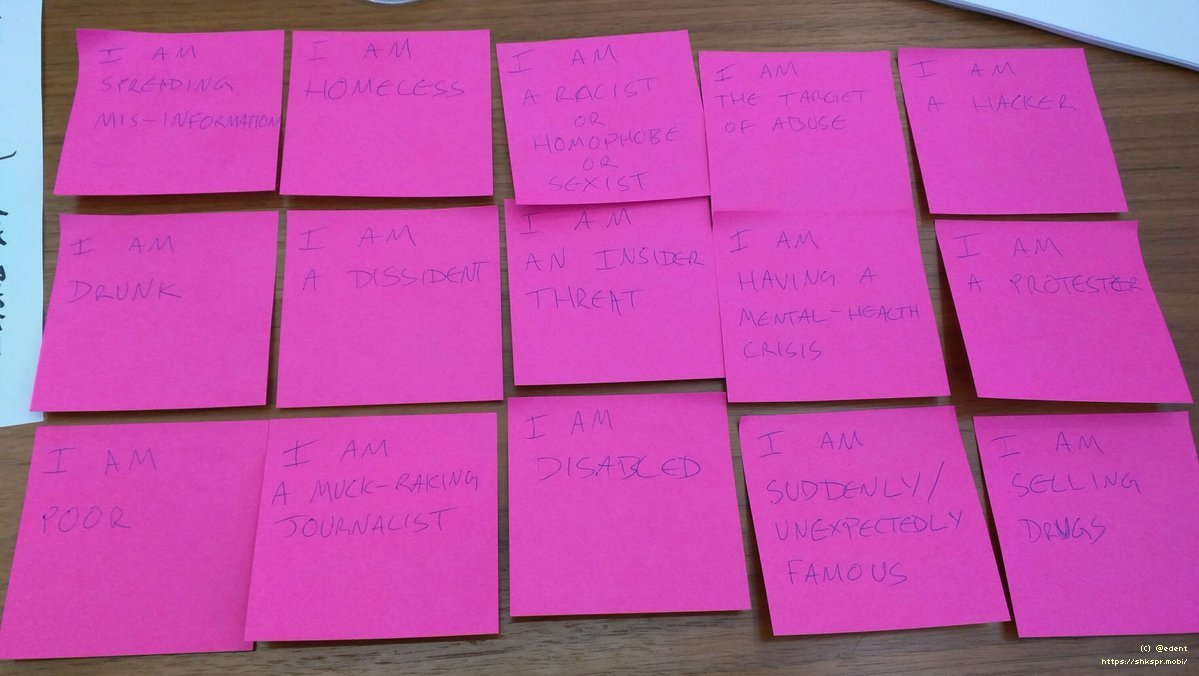Debuffs, Enchantment, Equipment, and Players - an RPG Player's Guide to User Stories
If you've spent any time in a modern design environment, you'll be familiar with the idea of User Stories.
As a first-time user, I want to log in with Facebook, so that I don't have to set up a new account.
Fairly easy, right? Stick enough of those up on a wall and you've got yourself a party!
If you've ever played an RPG or Roguelike game, you'll be familiar with how your character can evolve throughout a game.
You put on a cursed ring! Your attacks now do 10% less damage! (A typical debuff)
So, let's apply a little video-game learning to our user centred design.
I've written previously about drunken user testing - being sloshed is a temporary physiological and neurological impairment. One that may affect the majority of your users. I remember trying to order a Chinese takeaway using an app while inebriated - it didn't end well!
Now, you wouldn't necessarily rewrite all your stories with "As a drunk user, I..." but it is certainly worth scribbling out a few stickers which you can overlay on existing stories. How do you change your design and your code if you assume the user is a lush?
There's a serious point here (somewhere). Minority users often have exactly the same desires as majority users - but they may need a different way to achieve them.
For example, a blind user will almost certainly want to use the full functionality of your site. Is it enough to just have one user story saying:
As a blind user, I want the site to comply with accessibility best practices, so that I can use it effectively.
I don't think so. I mean, it is better than nothing, but almost every story should be tested against a variety of variables.
Of course, just as in video games, sometimes our users receive a little boost - an Enchantment - which makes them better able to perform some tasks. How should we cope with users who are better than we are at using our system?
Finally, Equipment. Some of you are reading this blog post using an extremely expensive, high powered computer, with a massive screen and jiggaflops of RAM - others are having bytes transmitted via carrier-pigeon and carved into a potato.
I've quickly jotted down some typical amendments which can be applied to most user stories.
| Debuff | Enchantment | Equipment |
|---|---|---|
| Blindness | Highly caffeinated | Internet Explorer 6 |
| Tiredness | Lots of free time | iPhone 7 with a low battery |
| Poverty | Over confidence | Cracked screen |
| A slow Internet connection | A very fast Internet connection | E-Ink Device |
(Feel free to argue about exactly where each of those item should go - you get the general idea.)
If you're playing a game and are armed with only a cursed wooden spoon and flammable armour, it is unlikely you'll beat the dungeon's dragon boss. Similarly, a tired user with Parkinson's and an old BlackBerry running on 2G, may find using our service difficult.
Think about what attributes you can add to your user stories. Randomly sprinkle them through your design process. Help developers and designers understand that there's no such thing as a typical user.
Addendum
This discussion was sparked off at a design day. A very lovely agency had written out some lovely user profiles for us. You know the sort "Dave, 35, busy juggling 3 kids and love of golf" and "Denise, 22, wants to keep up with technology" that kind of thing.
They seemed rather put out when I started adding my own notes to them. Little speech bubbles saying:
- I am secretly gay.
- I am drowning in debt.
- I am a victim of domestic violence.
- I am wanted by the police.
- I am embezzling money.
- I am getting a divorce.
- I am a social media troll.
- I have PTSD.
Not things which normally go on to a persona - but real problems which affect a lot of our users. We can't assume everyone who interacts with our stuff is happy, healthy, and honest.
Some of our personas should reflect the ugly reality of humanity:
As a racist, I want to be able to send offensive messages, so that I can assert my dominance.
How do we cater for these stories? I don't mean "how do we make a racist social network?" but rather "how do we minimise the harm from or to this sort of user?"
I'm not trying to criticise User Stories - I'm saying that we should consider that a typical user gets tired, has low battery, may want to hide an aspect of themselves, needs some protecting, and often changes throughout the course of the day.
So, Product Owners, it is time to level up! Or, as I prefer to say, +1 to inclusiveness.

2 thoughts on “Debuffs, Enchantment, Equipment, and Players - an RPG Player's Guide to User Stories”